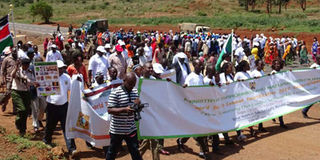Ministry makes effort to manage drought, famine

School children and locals match to Hula Hula Catholic Church in Marsabit County on June 17, 2017 to mark the World Day to Combat Desertification and Drought. Environment Cabinet Secretary Judi Wakhungu said desertification must be tackled. PHOTO | IRENE MWENDWA | NATION MEDIA GROUP
What you need to know:
- Ms Judi Wakhungu said that Marsabit, Isiolo and Wajir counties were the most hit by drought, which led to loss of livestock.
- Ms Judi Wakhungu said strategies to make land more productive should be taken up.
Environment, Water and Natural Resources Cabinet Secretary has said that the marking of the World Day to Combat Desertification and Drought will go along way in ensuring that sustainable development is prioritised.
Ms Judi Wakhungu on Saturday graced the celebration held at Hula Hula in Marsabit County, where she said that migration trends as a result of desertification and drought are worrying.
Consequently, she observed, the movements have evoked tensions and conflicts in the region and beyond, which affects economic growth.
"The scenario triggered massive community migrations across counties and landscapes presenting a great challenge to sustainable development," she said.
FOOD PRODUCTION
The CS said that Marsabit, Isiolo and Wajir counties were the most hit by the prolonged drought that led to massive loss of livestock.
To prevent more calamities, she suggested that strategies to make the landscapes more productive should be taken up.
"The situation created by the drought shows that there is need to invest in strategies, projects, programmes and policies at both national and county levels for combating desertification," she said.
To show her commitment to managing the problems, she said her ministry has developed several policy frameworks on environmental management to address the issues.
BAN ON PLASTICS
To make the efforts come to fruition, the ministry boss urged locals to support several initiatives such as the ban on manufacture and use of plastic bags, which pollute surroundings.
"This development is meant to rescue our mother nature from the devastating plastic bags menace and allow Kenyans to enjoy a clean and healthy environment."
She also launched and flagged off the rehabilitation project by the Kenya Forest and Kenya Wildlife Services combating soil erosion on the Isiolo-Marsabit highway.

National Environment Management Authority board chairperson John Konchella officiates the start of Hula Hula Gulley Rehabilitation on the Isiolo-Marsabit highway on June 17, 2017, to manage soil erosion. PHOTO | IRENE MWENDWA | NATION MEDIA GROUP
The event hinged on deforestation, land degradation and overgrazing.
IRRIGATION SCHEME
The National Environment Management Authority Director General Geoffrey Wahungu said the agency will aid the Kenya Red Cross Society to build an irrigation scheme in Walda in Moyale sub-county to tackle desertification.
"Today’s theme [is] on the central role productive land can play in turning the growing tide of community migration into places that are stable, secure and sustainable," Mr Wahungu said.
MARSABIT FOREST
At the same time, local leaders insisted that the ministry must provide alternative sustainable water points for the locals or else Marsabit Forest, which is their main source of water will continue to suffer encroachment and deforestation.
"If we cannot come up with proper and clear ways of preserving our forest, we will not be able [to] prevent the locals from encroaching and destroying the forests.
"This is a forest that [is] surrounded by deserts, hence it is a place people and livestock run to," Argelle Lechugu, Karare ward MCA, said.
Marsabit is home to Chalbi, Didi Galgalu and Kaisut deserts.




